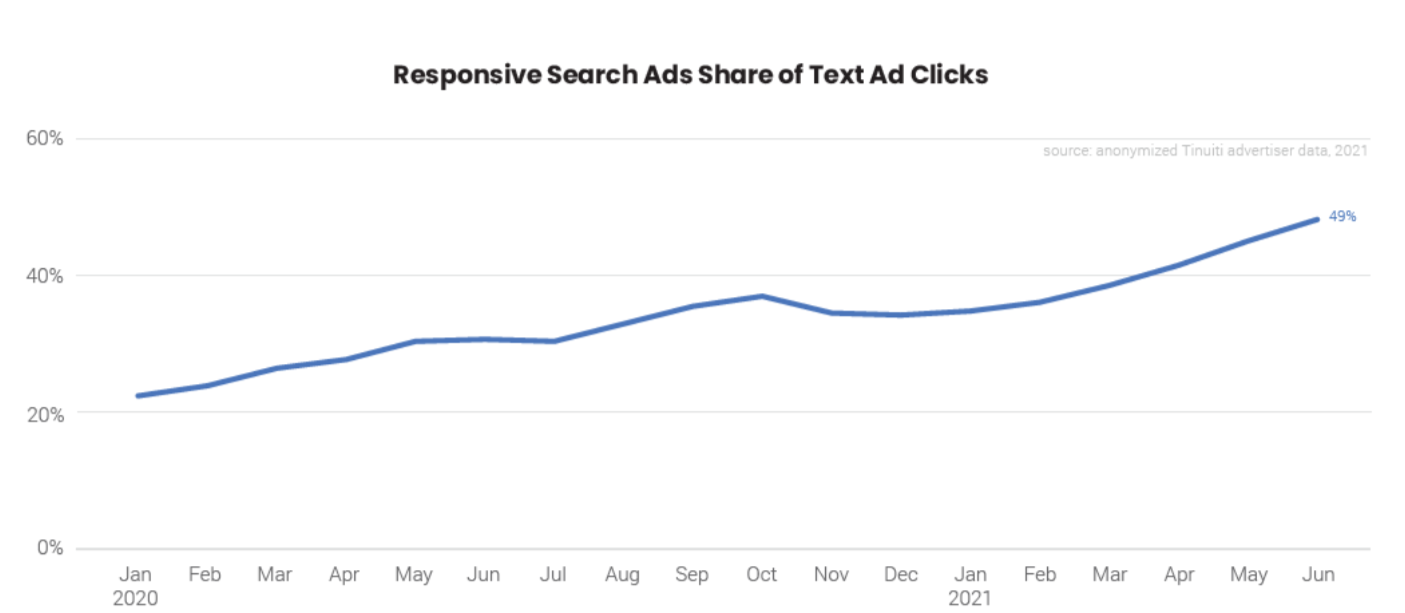Google to Sunset Expanded Text Ads, Making Responsive Search Ads the Way of the Future

The way people search is changing daily and according to Google, “15% of search queries every day are new searches we’ve never seen before.”
For nearly a decade, Google has demonstrated the desire and ability to adapt to changing search user habits and goals with advertisements.
In the latest announcement, starting June 30, 2022, responsive search ads will be the only Search ad type that can be created or edited in standard Search campaigns. Meaning after June 30, 2022, you’ll no longer be able to create or edit expanded text ads. Ultimately, the goal of this change is to help “simplify the way you create Search ads and make it easier for you to drive performance with our automated tools”. [Source]
In the following article, we spoke with our Search experts to get their take on the recent announcement and what marketers should do to prepare.
According to Google:
“Responsive search ads combine your creativity with the power of machine learning to help you show more relevant ads to more people. This is a powerful combination: advertisers that switch from expanded text ads to responsive search ads, using the same assets, see an average of 7% more conversions at a similar cost per conversion.”
As you can see in the recent data collected by Andy Taylor, Head of Research at Tinuiti, responsive search ads have been growing in popularity for quite some time:


After June 30, 2022, advertisers will no longer be able to create or edit expanded text ads.
However, there are a few exceptions to take note of:
Pro-tip: To prepare for this change, Google recommends that you have at least one responsive search ad in every ad group in your Search campaigns by June 30, 2022. You can learn more about how to set up your responsive search ads for success.
We spoke with Lauren Mahon, Strategist, Paid Search at Tinuiti to get her take on the recent Google announcement as well as the next steps for marketers:

A. I love the concept of RSAs and think it’s absolutely the right move to lean into an ad type that allows advertisers to tailor the ad copy to each user’s individual wants, needs, and behavior patterns. My hope is that Google becomes much more transparent with asset performance, and at a more granular level, so that advertisers can use data to directly adjust messaging and go-forward strategies.
A. RSAs are (currently) a black box. The only performance metrics currently available to advertisers is impression data at an overall asset level (aka account level). Ad strengths are also available by asset but since a large percentage fall under “pending,” that guidance is not always as helpful.
In direct response accounts I have managed, RSAs tend to drive stronger CTRs but lower CVRs and higher CPAs. Ad strength is an imperative component of RSA success and in my experience, the only way to improve this is to dive into each individual ad group (within the UI) to review Google’s recommended ad modifications.
A. I would love Google to continue showing impression-level data at an asset level, but it would be great to also see secondary metrics that are applicable when that asset serves (similar to ad extension reporting). Since the system already displays a preview of most-served ad combinations, it would be ideal to see other data metrics under this view (including clicks, CPC, conversions, and more).
Regardless of metrics that become available at the asset level, I would love to be able to apply filters. Oftentimes, HL or descriptions may be used across a large part of the account but it would be helpful to be able to segment by brand / nonbrand, campaign, audience, etc.
We will continue to monitor this announcement and provide our readers with any relevant next steps. For more information, reach out to our team to learn more about how responsive search ads can impact your performance.
